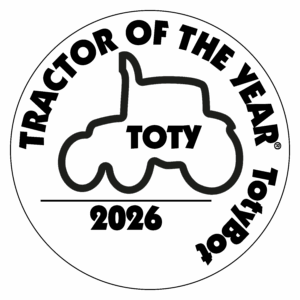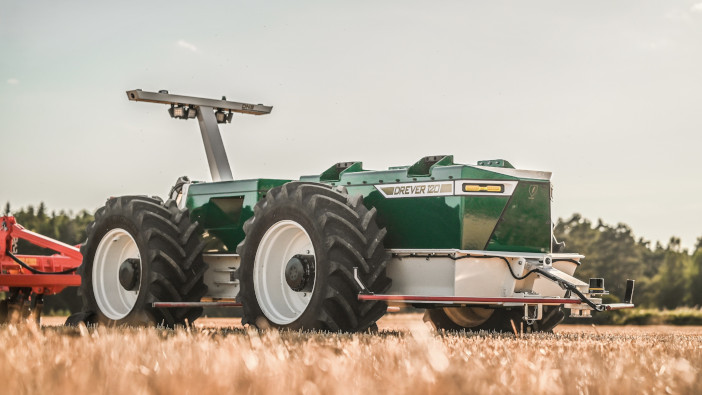Designed for heavy field work with trailed implements, while minimising soil compaction, the fully electric, articulated Drever 120 is fitted with two 250kW batteries and a specially designed charger. Feeding into four 50kW wheel motors, it can provide continuous power of 12.5kW at each corner of the machine with up to 4,000Nm of torque at each wheel.
Using the specially designed charger, charging times from 20% up to 80% are said to be just five hours, and the machine has a working range of five hours at full engine load.
It uses an in-house developed planetary gear transmission, providing in-field speeds of 12kph, with 94% efficiency at 10kph. Uniquely, it can also be set to freewheel, enabling it to be towed to the field by a tractor and is rated for road speeds up to 45kph.
Separate, electrically controlled hydraulic pumps provide 40 litres/min to four electronic valves at the rear. As each wheel is electrically driven, the machine can adjust wheel speeds in tricky conditions, with failsafe hydraulic steering during excessive slippage. The rear lift is controlled by electric actuators, providing a maximum capacity of 3,000kg.
Electric connectors are provided to power the rear implement, and while the company states that a front pto is possible, the machine is specifically designed for pulling.
 An in-house navigation system has been developed, controlled through a web portal, with two RTK antennas mounted on the machine. It is also fitted with Lidar sensors and a 360deg camera system, automatically slowing down when an obstacle is detected and stopping completely if the obstacle does not move. Bumpers are fitted at the front and between the two wheels for mechanical obstacle detection, and the company can also fit these to the implement if required.
An in-house navigation system has been developed, controlled through a web portal, with two RTK antennas mounted on the machine. It is also fitted with Lidar sensors and a 360deg camera system, automatically slowing down when an obstacle is detected and stopping completely if the obstacle does not move. Bumpers are fitted at the front and between the two wheels for mechanical obstacle detection, and the company can also fit these to the implement if required.
According to the company, Isobus functionality is currently under development, and the machine will go into production in 2027.


